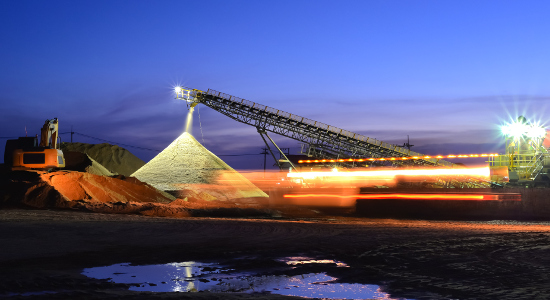
May 31, 2017 – The Wisconsin Supreme Court has narrowly upheld the denial of a conditional use permit for non-metallic mineral mining submitted by a company that mines silica sand used in hydraulic fracturing, also known as sand fracking.
The Trempealeau County Environment & Land Use Committee denied the permit application submitted by AllEnergy Corporation and AllEnergy Silica (AllEnergy).
AllEnergy was keen on mining in Trempealeau County, home to vast reserves of silica sand that is used to engage in frac sand mining for oil and natural gas reserves.
The frac sand is used in connection with water, chemicals, and explosives to create cracks in subsurface material, drawing out any oil and natural gas into wells.
AllEnergy located a mining site in the Town of Arcadia, north of La Crosse. The site was zoned for farming and to “preserve woodlands, wetlands, natural areas and the rural atmosphere of the County.” Thus, AllEnergy filed a conditional use permit for the site.
The projected site was 550 acres, with a 265-acre mining site. Ultimately, the county’s Environment & Land Use Committee (committee) voted to deny the permit, even with numerous conditions. The circuit and appeals courts upheld the committee’s decision.
In AllEnergy Corporation v. Trempealeau County Environment & Land Use Committee, 2017 WI 52 (May 31, 2017), four justices affirmed. But no majority could fully agree on why the committee was justified or not in denying the permit application. Two justices concurred, creating a majority for upholding denial. Three justices dissented.
Lead Opinion
Justice Shirley Abrahamson wrote a lead opinion, joined by Justice Ann Walsh Bradley, concluding the committee kept within its jurisdiction when denying the application on the basis of public health, safety, and welfare.
Abrahamson noted that a county zoning ordinance directed the committee to approve conditional use permits only if a proposed use or location will not be detrimental to health, public safety, or character of the surrounding area.
“In determining whether to grant AllEnergy a conditional use permit, the Trempealeau County Environment & Land Use Committee considered and applied the criteria set forth in the ordinance,” Justice Abrahamson wrote.
 Joe Forward, Saint Louis Univ. School of Law 2010, is a legal writer for the State Bar of Wisconsin, Madison. He can be reached by email or by phone at (608) 250-6161.
Joe Forward, Saint Louis Univ. School of Law 2010, is a legal writer for the State Bar of Wisconsin, Madison. He can be reached by email or by phone at (608) 250-6161.
Abrahamson rejected AllEnergy’s claim that non-metallic mining was a conditional use that was already allowed for in the zoning location, so the committee could not deny the application as not in the public interest. That decision is discretionary, she said.
“[O]ur precedent dictates that no presumption exists that a conditional use is ipso facto consistent with the public interest or that a conditional use is a use of right at a particular site within a given area zoned to permit that conditional use,” Abrahamson wrote.
The lead opinion concluded that substantial evidence supported the committee’s denial on the basis that it raised environmental and health concerns, as well as concerns that a mining site would adversely alter the character, culture, and aesthetics of the area.
And the opinion declined AllEnergy’s request to adopt a new doctrine that requires a permit to be approved if an applicant has shown that “all conditions and standards, both by ordinance and as devised by the zoning committee, have been or will be met.”
Concurrence
Justice Annette Ziegler, joined by Chief Justice Patience Roggensack, wrote a concurring opinion that affirmed the denial of the conditional use permit.
Justice Ziegler said the case should be decided narrowly and “the lead opinion and the dissent have made this case much more complicated and potentially more far-reaching in effect than it should be.”
The committee did not exceed its jurisdiction, Ziegler concluded, and evidence supported denial on the basis of legitimate environmental and health concerns.
But she would have ended there. “For example, the lead opinion engages in a discussion of the constitutionality of certain of Trempealeau County’s ordinances, in disregard of the basic judicial principle that courts do not adjudge the constitutionality of legislation unless it is necessary to do so,” Justice Ziegler wrote in concurrence.
Dissent
Justice Daniel Kelly dissented, joined by Justices Michael Gableman and Rebecca Bradley. They would reverse and remand to the Environmental & Land Use Committee for a review of the permit application under standards addressed by the dissent.
Justice Kelly noted that the zoned area at issue already allowed non-metallic mining under a conditional use permit. That is, the Trempealeau County Board already determined that a non-metallic mine could operate there with proper conditions.
Thus, the committee was required to review whether special problems or hazards could be controlled with appropriate conditions, not whether a sand mine was an appropriate use of the property. Thus, in Kelly’s view, the committee exceeded its jurisdiction.
“The Committee also acted arbitrarily by failing to apply appropriate pre-existing standards to the specific proposal contained in AllEnergy’s application,” he wrote.
